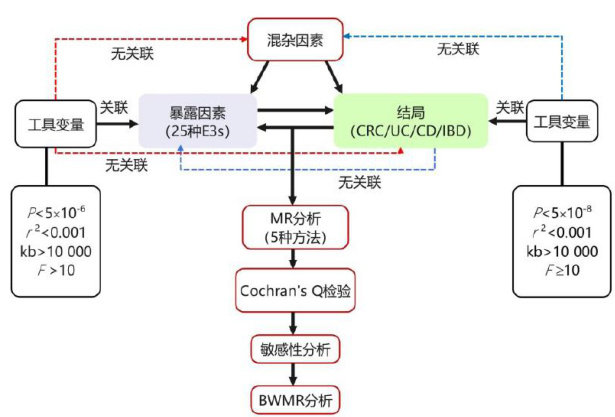E3泛素连接酶与炎症性肠病及结直肠癌的因果关联:一项孟德尔随机化研究


打开文本图片集
中图分类号:R735.7 文献标志码:A 文章编号:1001-5779(2025)08-0725-08
DOI:10.3969/j.issn.1001-5779.2025.08.001
Abstract:Objective:ExploringthecausalrelationshipbetweenE3ubiquitin ligases(E3s)and Inflammatory bowel disease(IBD)andColorectalcancer(CRC).Methods:Thecausalrelationship between 25E3sand IBD/CRC was studied through bidirectional Mendelianrandomization(MR)and Bayesian weighted mendelianrandomization(BWMR).The MRanalysis was comprehensively evaluated using inverse variance weighting,MR-Egger regression,weighted median, simplemodeand weighted mode,and wassupplemented bysensitivityanalysissuchasheterogeneitytest,horizontal pleiotropic test(MR-PRESSOand MR-Egger)and retention-one-based analysis to ensure the robustness of the results. Results:RNF13,RNF128 and ZNRF3 showed positive associations with IBDrisk(OR=1.079,P=0.001;OR=1.075, P=0.023;OR=1.113,P=O.O19).Notably,RNF13demonstratedamarginallsignificantpositive associationwithUCrisk (OR=1.072,P=0.046),while ZNRF3 wassignificantly associated with increased CD risk(OR=1.291,P=0.005). For CRC,RNF8 exhibiteda negative assciation(OR=0.906,P<0.O01),whereas RNF34 showed apositive association with increased risk(OR=1.081,P=0.O16).Conclusion:The findings demonstrate causal relationships between RNF13,RNF128,ZNRF3 and IBD development(with RNF13 specificall associated with UC and ZNRF3 showing significantassociation withCD).Additionally,RNF8 was identifiedasaprotectivefactoragainst CRC,whileRNF34 was found to promote CRC risk.
Key Words:E3 ubiquitin ligases;Colorectal cancer;Inflammatory bowel disease;Mendelian randomization
目前,结直肠癌(Colorectalcancer,CRC)作为一种恶性肿瘤,在发病率和死亡率方面分别位居世界第三和第二[]。(剩余13880字)